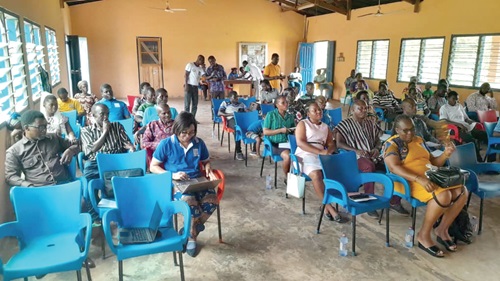
A GH¢4.28 million project to improve nutrition of mothers and their children who are under five years has taken off at Dwerebease in the Kwahu East District in the Eastern Region.
The one-year project being executed by the Hunger Project Ghana with funding from the Church of Jesus Christ of Latter Day Saints would also benefit people in communities in the nearby Kwahu South Municipality.
The people in some of the communities in two areas within the epicentre are peasant farmers with little income for their sustainability, particularly for the improvement of their diets.
An epicentre has, therefore, been established at Dwerebease in the Kwahu East District to deal with the issue.
The beneficiary communities are Dwerebease and Koranteng, Onyinso and Abotransa in the Kwahu South Municipality. As part of the package, the inhabitants, particularly pregnant and lactating women and children under five years, will be provided with food supplements periodically.
Also, a demonstration farm will be established to deal with malnutrition and especially educate the inhabitants in the consumption and benefits of good diet. At a stakeholder meeting involving officials of the two assemblies, chiefs and people at Dwerebease last Wednesday to officially kick-start the project, the Country Director of the Hunger Project Ghana, Samuel Afrane, said generally the project had three components namely nutrition, agriculture and Water, Sanitation and Hygiene (WASH).
Mr Afrane said the beneficiaries would be given nutritional supplements such as folic acid and vitamin 'A' to improve the iron content of food consumed especially by pregnant and lactating women as well as children under five years.
With regard to agriculture, Mr Afrane stated that a demonstration farm would be established and farmers in the area would be taken through the best practices of the cultivation of food crops such as maize and vegetables among others.
 Stakeholders to officially kick-start the nutrition project
Stakeholders to officially kick-start the nutrition project
He stated that the farmers would also be provided with agricultural inputs acquired through soft loans, to enhance the production of such crops. Apart from that, the Country Director pointed out that agricultural experts would regularly supervise the farmers on all aspects of food production.
Touching on the WASH component, Mr Afrane said 20 handwashing stations would be set up in the beneficiary communities, while places of convenience would be constructed in schools in the area.
The Country Director said the organisation had decided to carry out such initiative, after realising that pregnant and lactating women as well as children under five years were not having good diet.
Explaining that mothers, especially pregnant and lactating ones, normally experienced malnutrition, Mr Afrane stated that the project would enable the women to bring forth healthy babies who would in turn have good diets after birth.
He said children under five years had been included in the project because they constituted about 20 per cent of the population. The Kwahu South Municipal Planning Officer, Odehyieba Frimpong Agyekum, said the project would complement the efforts of the assembly to improve the nutritional needs of the beneficiaries and also improve the cultivation of food crops in the area.
The Kwahu East District Engineer in charge of Water and Sanitation, Stephen Amenyah, also assured of the project's sustainability in beneficiary communities in the district.